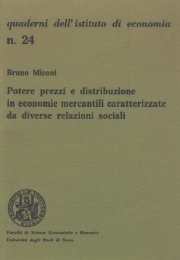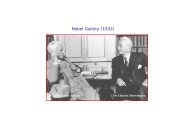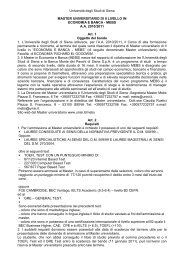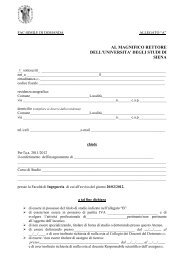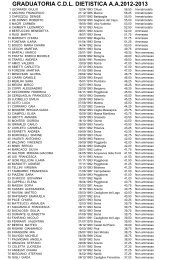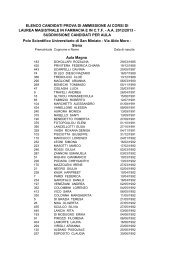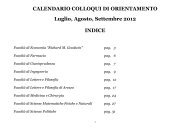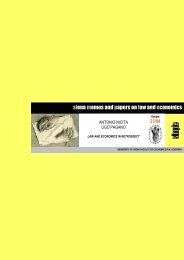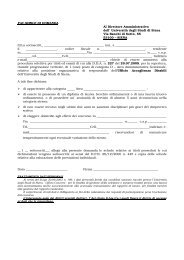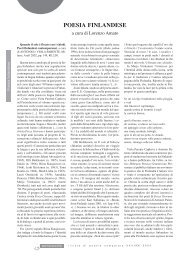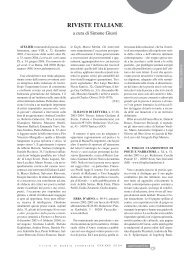On the boundary between evaluation and metadiscourse
On the boundary between evaluation and metadiscourse
On the boundary between evaluation and metadiscourse
Create successful ePaper yourself
Turn your PDF publications into a flip-book with our unique Google optimized e-Paper software.
"This seems somewhat counterintuitive, though…" –<br />
Negative <strong>evaluation</strong> in linguistic book reviews by male <strong>and</strong> female authors<br />
Ute Römer (University of Cologne, Germany)<br />
As Thompson <strong>and</strong> Hunston note, "<strong>the</strong> expression of <strong>the</strong> writer's or speaker's opinion is an important<br />
feature of language" (2000: 2). This is particularly true for book reviews in which <strong>the</strong> expression of<br />
opinions is one of <strong>the</strong> central features. In this special text genre authors provide <strong>the</strong> research<br />
community with valuable information about new publications in <strong>the</strong>ir area of study <strong>and</strong> thus help<br />
people choose from <strong>the</strong> wide range of available books those books which <strong>the</strong>y might most profit<br />
from. Reviewers do this by commenting on <strong>the</strong> book <strong>and</strong> by telling future readers what <strong>the</strong>y think<br />
about it.<br />
An important part of each review is a critical <strong>evaluation</strong> of <strong>the</strong> book. In <strong>the</strong> guidelines for<br />
submitting reviews for Linguist List issues, prospective reviewers are explicitly asked, in addition<br />
to summarising <strong>the</strong> book's contents, to "point out merits <strong>and</strong> defects, identify problems, ask<br />
questions, <strong>and</strong> present positive or negative implications of <strong>the</strong> analysis." (Linguist List 2003: 2) The<br />
present paper centres on negative critical <strong>evaluation</strong> in linguistic book reviews <strong>and</strong> looks at ways in<br />
which review authors refer to defects <strong>and</strong> problems of <strong>the</strong> work under analysis. My main interest<br />
lies in <strong>the</strong> expression of negative <strong>evaluation</strong> as reviewers (including myself) may often find it<br />
difficult to criticise o<strong>the</strong>r researchers' works in a polite <strong>and</strong> face-saving way, face-saving (in <strong>the</strong><br />
sense of Brown <strong>and</strong> Levinson 1987) both for <strong>the</strong> reviewer <strong>and</strong> for <strong>the</strong> author of <strong>the</strong> book.<br />
I use <strong>the</strong> term "<strong>evaluation</strong>" in a ra<strong>the</strong>r general sense as defined by Thompson <strong>and</strong> Hunston. They<br />
refer to <strong>evaluation</strong> as "<strong>the</strong> broad cover term for <strong>the</strong> expression of <strong>the</strong> speaker or writer's attitude or<br />
stance towards, viewpoint on, or feelings about <strong>the</strong> entities or propositions that he or she is talking<br />
about." (2000: 5) An analysis of negative <strong>evaluation</strong> in book reviews hence deals with <strong>the</strong><br />
expression of a negative attitude towards, a negative viewpoint on, or negative feelings about <strong>the</strong><br />
books under review. I apply a corpus-driven method of tracing negative evaluatory expressions in<br />
<strong>the</strong> Book Reviews In Linguistics Corpus (BRILC), an electronic collection of 222 English language<br />
reviews, 111 by female <strong>and</strong> 111 by male authors, published online in Linguist List issues in 2002<br />
<strong>and</strong> 2003. BRILC is designed as a monitor corpus <strong>and</strong> contains at present 505,330 tokens (February<br />
2003). The focus of <strong>the</strong> analysis lies on adjectival criticism, in particular on a list of some 70 graded<br />
adjectives which are used in critical or negative contexts (e.g. difficult, lengthy, unclear, or vague).<br />
Thus, one of <strong>the</strong> research questions is "Which adjectives do people repeatedly use to make critical<br />
statements about linguistic books?" These adjectives are often found to be premodified by adverbs<br />
like somewhat, ra<strong>the</strong>r, or quite, which have a downtoning or softening effect, often labelled<br />
"hedging" by pragmaticists. A fur<strong>the</strong>r question, <strong>the</strong>refore, deals with <strong>the</strong> shares of hedging of<br />
negative graded adjectives.<br />
In <strong>the</strong> context of this analysis, BRILC concordances of <strong>the</strong> selected adjectives were filtered<br />
manually (to exclude critical references to sources o<strong>the</strong>r than <strong>the</strong> book under review) <strong>and</strong> sorted<br />
according to <strong>the</strong> gender of <strong>the</strong> reviewer. This sorting process made it possible to see whe<strong>the</strong>r <strong>the</strong>re<br />
are qualitative <strong>and</strong>/or quantitative differences in <strong>the</strong> use of critical adjectives by men <strong>and</strong> women,<br />
i.e. whe<strong>the</strong>r <strong>the</strong> language of male or female reviewers contains more (or more critical) instances of<br />
negative <strong>evaluation</strong>. The results of this gender-related part of <strong>the</strong> analysis are particularly striking<br />
<strong>and</strong> imply <strong>the</strong> necessity of rethinking traditional assumptions about <strong>the</strong> relations <strong>between</strong> language<br />
<strong>and</strong> gender. Empirical sociolinguistic findings concerning politeness phenomena in conversational<br />
interaction (e.g. that women are more polite, less critical, <strong>and</strong> use more hedging or softening<br />
devices, cf. for instance Lakoff 1975, Holmes 1995) do not seem to be valid in <strong>the</strong> context of<br />
academic (review) writing. Often language differences which are ascribed to gender may depend on
o<strong>the</strong>r factors like aims of <strong>the</strong> discourse, power relations, or <strong>the</strong> context of <strong>the</strong> actual speech or<br />
writing situation. As has been hinted at in recent sociolinguistic studies, we probably have to<br />
include "<strong>the</strong> perceived norms of <strong>the</strong> community of practice" in our analyses of politeness <strong>and</strong><br />
gender (Mills 2000: 10; cf. also Bing <strong>and</strong> Bergvall 1996). Fur<strong>the</strong>r comparative analyses of <strong>the</strong><br />
writing of men <strong>and</strong> women in different settings (<strong>and</strong> in different written registers) might challenge<br />
or at least weaken <strong>the</strong> oversimplified male-female dichotomy <strong>and</strong> lead to a more contextualised,<br />
more complex, <strong>and</strong> less binary approach to gender studies in linguistics.<br />
References<br />
Bing, Janet M. <strong>and</strong> Victoria L. Bergvall. 1996. The Question of Questions: Beyond Binary<br />
Thinking. In: Victoria L. Bergvall, Janet M. Bing <strong>and</strong> Alice F. Freed (eds.). Rethinking Language<br />
<strong>and</strong> Gender Research. Theory <strong>and</strong> Practice. London: Longman. 1-30.<br />
Brown, Penelope <strong>and</strong> Stephen C. Levinson. 1987. Politeness. Some Universals in Language Usage.<br />
Cambridge: Cambridge University Press.<br />
Holmes, Janet. 1995. Women, Men <strong>and</strong> Politeness. London: Longman.<br />
Lakoff, Robin. 1975. Language <strong>and</strong> Women's Place. New York: Harper Colophon Books.<br />
Linguist List. 2003. Review Guidelines. Available online at:<br />
http://saussure.linguistlist.org/cfdocs/new-website/LL-WorkingDirs/pubs/reviews/guidelines.cfm<br />
Mills, Sara. 2000. Rethinking Politeness, Impoliteness <strong>and</strong> Gender Identity. Available online at:<br />
http://www.linguisticpoliteness.eclipse.co.uk/Gender%20<strong>and</strong>%20Politeness.htm<br />
Thompson, Geoff <strong>and</strong> Susan Hunston. 2000. Evaluation: An Introduction. In: Susan Hunston <strong>and</strong><br />
Geoff Thompson (eds.). Evaluation in Text. Authorial Stance <strong>and</strong> <strong>the</strong> Construction of Discourse.<br />
Oxford: Oxford University Press. 1-27.



